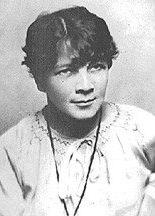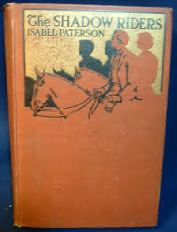[cross-posted at Liberty & Power]
One of Isabel Paterson’s earliest novels (indeed her first published, though not her first written), The Shadow Riders, has turned up on Google Books.
 While it’s not the literary tour de force that many of her later novels would be, it is nevertheless, like all her novels, damn good.
While it’s not the literary tour de force that many of her later novels would be, it is nevertheless, like all her novels, damn good.
Although several westerns have since used the title The Shadow Riders, Paterson’s 1916 novel is not a western; its setting is western Canada, but in an era when the frontier is well on the wane. The milieu reflects (as usual) Paterson’s own background, and the heroine is (again as usual) a thinly disguised version of Paterson herself; the book’s subject matter is the interrelated realms of business, politics, journalism, and social mores.
But that synopsis sounds rather dull, and the book is no such thing, so let me simply quote a few passages, picked nearly at random – some witty, some serious – to give you a sense of the book’s style:
He was quite a young man to write a diplomatic communication. He thought, if a thing was to be made understandable, it should be said plainly.
 Lesley felt symptoms of imminent suffocation. She wished benevolently that she could share them with Mrs. Cranston – in short, that she might choke that injudicious lady.
Lesley felt symptoms of imminent suffocation. She wished benevolently that she could share them with Mrs. Cranston – in short, that she might choke that injudicious lady.
There is an old proverb which says that one can catch more flies with honey than with vinegar. It is doubtless a true saying; I only wonder what one does with the flies after having caught them.
And his patriotism – it burned, oh, indeed, it went up in fireworks that left trails of glory down the lowering sky! One could see him repelling an imaginary enemy at the point of a lance – well, no, hardly that, but one could see a band of gallant youths doing the repelling, while Folsom waited with decorations and wreaths in the rear.
He envied Ross, who had somehow gone past these things, got beyond good and evil to necessary and unnecessary, inexpedient and expedient, pleasant and disagreeable. Had he known through what bitter waters Ross had reached his Fortunate Isle, he might not have envied.
Eileen’s face betrayed no consciousness of victory. It expressed neither triumph nor disdain, but a peculiar innocence and unawareness, which innocence itself cannot achieve. It is a look only possible to a woman who has suffered, and deliberately forgotten; it can outface innocence itself because it has no mingling of curiosity; it is invulnerable – from the outside.
The sole impress of a too fortunate youth was discoverable in some quality of his manner which made plain that he was no longer interested in himself. Life had been too kind to him in every material way; he was politely perplexed with a profusion so great, and ambition lay dead of satiety.
Her senses rebelled against her will, and though she retained command, for a sweet and terrible moment she could feel her inner self bend and sway toward him like a reed in the wind. It cost her a sharp, sickening pang to rise and move away from him a step. … For a long, long time afterward she could feel that pain again when she remembered, for it seemed as if she had then lost something out of her life that would never come again with quite the same power, the same promise of completeness and delight. All that he saw was that her mouth set hard for a moment, the short pink upper lip losing its laughing tilt; and her hands, so lax and helpless in her lap, shut determinedly.
[I]n all passionate love there’s a hard, insatiable core, that nothing could fully satisfy, so it always burns beneath the ash of fulfilled desire. No man or woman is quite absolutely enough for any other woman or man. Neither would a world of them be.
(On Paterson’s novels generally see here, here, here, here, here, and here.)